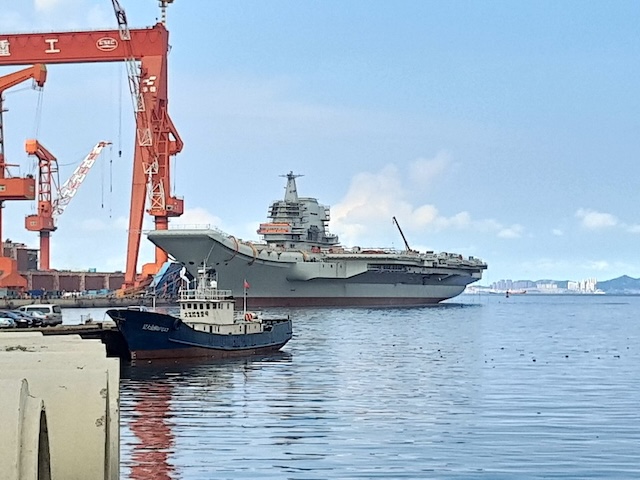Type 002-class (Shandong / CV-17)
Summary
| Origin country | 🇨🇳 China |
| Category | Aircraft carrier |
| Subtype | STOBAR Aircraft carrier |
| Manufacturer | Dalian Shipbuilding Industry |
| Year commissioned | 2019 |
| Units | 17 Shandong |
Operators
Description
The Type 002 aircraft carrier, named Shandong (17), is the first such vessel constructed domestically by the People's Republic of China. Developed as a modified version of the Soviet Kuznetsov class, the ship is derived from the Type 001 Liaoning. Dalian Shipbuilding Industry began manufacture in 2013 and laid the keel in 2015. The vessel launched on 26 April 2017 and entered service with the People's Liberation Army Navy on 17 December 2019.
The ship employs a Short Take-Off Barrier-Arrested Recovery (STOBAR) system featuring a ski-jump ramp. Modifications from the preceding Type 001 include the removal of internal anti-ship missile silos to increase hangar space. The island superstructure is smaller than that of the Liaoning and incorporates a second glaze deck. Structural changes to the aft-starboard section include extended sponsons to provide additional deck space. The ski-jump ramp is set at an angle intended for the operation of Shenyang J-15 fighters. Propulsion is provided by conventional oil-fired boilers and steam turbines.
Following sea trials conducted between May 2018 and November 2019, the vessel reached initial operating capability in October 2020. Service history includes deployments to the Philippine Sea and the South China Sea for military exercises. In April 2023, the carrier conducted air and sea strike simulations during exercises near Taiwan. In October 2024, the vessel performed dual-carrier formation exercises alongside the Liaoning. During June 2025, the Shandong task group navigated past the Second Island Chain, conducting flight drills near the Bonin Islands and Okinotorishima atoll. The carrier visited Hong Kong in July 2025 before returning to its home port.
Technical specifications
| Displacement | 70000 tons |
| Range | 4000 km at 18 knots |
| Crew | 2300 members |
| Width | 75.0 m (246.1 ft) |
| Length | 305.0 m (1000.7 ft) |
| Air Park | |
| Propulsion | Conventional steam turbines, 4 shafts |
| Thrust | 200000 hp |
| Armament |
|
| Maximum speed | 31 knots |
Further Reading
As an Amazon Associate, we may earn from qualifying purchases.
